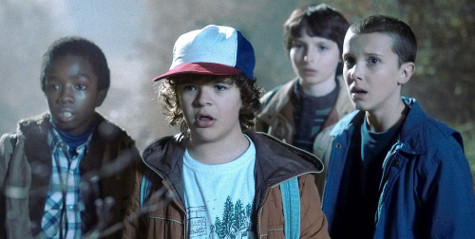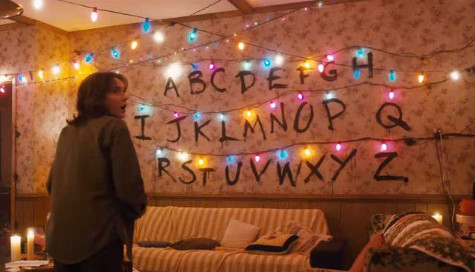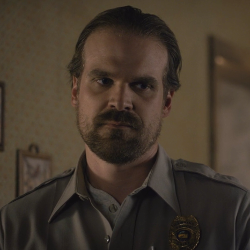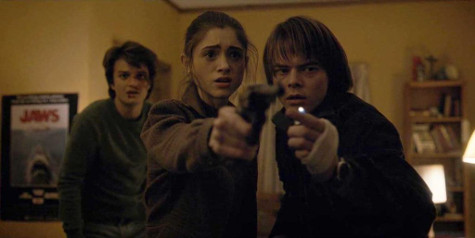
I'd been advised to watch Stranger Things from moment one; it was just a matter of getting to it. I am a child of the 80s, and I have always been—and remain—a Winona Ryder fan. I had crushing deadlines, but once Penny Dreadful wrapped up and I threw a fit about the way its finale was handled, I needed a solid palette cleanser.
Stranger Things was that and so much more, and with Season 2 official, I can relish fully without lament.
The series is unquestionably, utterly, painstakingly perfect 80s/early 90s. It is ET and X-Men and The Abyss and Stand By Me and Firestarter and Aliens and Goonies and Twin Peaks and Close Encounter and The X-Files all in one, and it does it better than any of them separately. All of those do indeed combine to make a perfect mix.
The tale is a paranormal suspense story centered around a missing child, his best friends, their families, and the big bad government secret in a small town.
It's importance and specificity as a period piece is as striking as its other wonderful qualities. The show is immersive in tone, look, sound, trope, and yet it does new and original things with each. It is unapologetic about what kind of piece it is, and yet it doesn't make tried/tired/damaging choices within those tropes.
The kids. Those kids are real. The central heroes are so alive—so funny, so fully realized, so well-written, so believable in an unbelievable scenario. Everyone is all in, no one is “talking at” or “playing at,” they are fully engaged and engaging. My love for each of these characters (save for the bullies you're not supposed to love, and yet they are still shown convincingly) ran deep; the rooting interests were super strong from the get-go and only deepened the more they problem solved.
I write large cast novels. It's hard to get an audience to care about everyone—even the most side-peripheral characters—but the Duffer Brothers made everyone interesting and important. Real. Amidst all the alien stuff, very human, subtle, understandable and deeply moving things were going on in every sphere.
Winona Ryder is at her best—as a mother on the edge trying to find her son, she was always convincing and fully realized. She was as tough and determined as she was terrified. She was well rounded, believable, and, as someone all of us Goth kids grew up thinking was our friend, the Feels Machine engine she kicked off was working overtime.

The Christmas lights. Sheer brilliance. That kind of problem solving and crisis management is so wonderful to see from characters who could have easily been written off as broken, weak, and crazy instead of being quirky champions. She's traumatized, clearly, but she's so strong and such a fighter, yet we never blame her for breaking down. Who would? We're on the roller coaster with her; a fully realized woman portrayed in a 360-degree emotional scope without damaging female stereotypes of fragility or limitation in play.
Again though, those 4 kids. Some of the best performances from young folks I've ever seen. Also, great, great writing for youth. They are as smart as they are moving, as funny and as unique as they are very much their age. The manner of the kids' problem solving is rooted in brilliant storytelling, incorporating their D & D campaign as archetypal form, aided and abetted by a fabulous science teacher I'd have loved to have had in school. The ways in which these young people adapted to, chafed against, related to, cared for, and learned from Eleven (a superstar performer in the making), building truly beautiful portrayals of friendship, it was the kind of storytelling that gives you faith in humankind.
We need that kind of team faith in a time of such divisive, immature hatred, tantrums, sexism, and extremism on the national stage. This show has heartless abuse pitted against true kindness, and loving friends and family win.
 The Sheriff. Oh, I was so prepared to hate that guy—the trope I narrowed my eyes at whenever they came on the screen to give Mulder and Scully a hard time in the X-Files days. And yet, oh, look what fully realized and emotionally rich backstory and writing can do … so I turned out to love him, warts and all, because he is real, he is trying, he is flawed, and we empathize and ache with his experience.
The Sheriff. Oh, I was so prepared to hate that guy—the trope I narrowed my eyes at whenever they came on the screen to give Mulder and Scully a hard time in the X-Files days. And yet, oh, look what fully realized and emotionally rich backstory and writing can do … so I turned out to love him, warts and all, because he is real, he is trying, he is flawed, and we empathize and ache with his experience.
I've been talking a lot lately about the importance of and the civic duty modern shows have in leaving damaging, violent tropes and stereotypes of women behind in favor of complexity, breadth, and full agency. But I think toxic masculinity limiting and shackling the male experience is just as problematic. This show lets all the male characters feel, relate, care, change, adapt, and grow fully. The burden of “hero” is shared, and everyone rises to their particular challenges in their own way. The emotional life is as rich and as story-driving as the action.
Also refreshing: the manner of the redemptive arc for Steve, the popular, mean boyfriend trope. I feel this is important because rarely does a young male character own up to being a dick, actually think about it in terms of emotions and ramifications, stand up to his toxic friends and actually do the right thing, accepting consequences and culpability in a way that seemed earnest. He had the insight to call his toxic influences “miserable” people in a moment of perspective, calling out hateful behavior as a result of the person's own shortcomings. What could have been a two-dimensional fight was given useful depth.
This made Steve's joining in the fight meaningful and earned. I love it when genuine nice-guy narratives are celebrated, as I feel they were in Jonathan, and also when better men are forged out of raw, immature material. That sets a great tone for us all: to improve and ditch those who bring out the worst in us as Steve did.

With that noise out of the way, we could celebrate Nancy “becoming a badass” all the more fully. She is accepted as brave and bold, and she takes to her mission fastidiously.
Barb, though. Poor Barb. Her storyline was full stereotype and painful as all heck, but I hear there's more for her ahead, so I'm withholding further thoughts/judgment.
Full 360-degree humanity is a BIG DEAL for me. So often in High Genre style, it's easy to rely on cookie cutter, on trope and stereotype alone. This series relies solely on our deep love of the childhood concepts brought to us by films, stories, games, nerd-culture, and shows of the age. It carries the genre with it to new places, foundations and all.
At every point, the Duffer Brothers wrote these distinct tales and tropes better and more inclusively, fuller, richer and deeper, and more substantive than the genre is usually afforded. The characters of color are seamlessly integral; they were not otherized or sacrificed—everyone had interweaving parts to play, and the collective spirit was uplifting.
As someone who loves great Fellowship tales, if these kinds of themes are your thing, if you loved the aforementioned influences or even the more recent film Super 8, do yourself a favor and love on this series.
For a few other relatively recent and related High Genre films (by High Genre I mean taking the Genre to the max) that almost become genre film studies in themselves and yet manage to avoid, subvert, or point out two-dimensional and or dangerous/damaging stereotypes, may I recommend the following:
- Crimson Peak (For a Gothic genre study)
- The Cabin in the Woods (For Horror genre study)
- Pacific Rim (For monster movie / Kaiju genre study)
As always, cheers, and Happy Haunting!
See also: 13 Books to Read If You Loved Stranger Things
Leanna Renee Hieber, actress, playwright, artist and award-winning, bestselling author, has written nine Gothic Victorian Paranormal novels for adults and teens, set in 1880s New York City and London. Her Strangely Beautiful saga hit Barnes & Noble and Borders Bestseller lists, garnered numerous genre awards, and has reissued in a special edition from Tor. Her new Gaslamp Fantasy trilogy, The Eterna Files, an X-Files meets Penny Dreadful kind of series, is now available from Tor, including the sequel Eterna and Omega.
Active on Twitter @LeannaRenee and Facebook /lrhieber, more about her work and art, as well as free reads and writing resources, can be found at http://leannareneehieber.com

Stranger Things is a rare beast. It avoids turning into a soap as most US series do, take The Walking Dead for instance, I followed it up to the episode that only had a token zombie in it and that was in a dream sequence, as though someone had realised after doing it that a zombie series should contain at least one? But Stranger Tides kept a tight rein on the balance of the thriller and its casting was excellent. If there was one minor blip I would say it was the main character 11, in that with the shaved head she looked like a boy and nobody seemed to mistake that she was a girl? But that was very minor as the tale rattled along with a pure 80’s vibe, one of the best of its kind. So long as the follow-up keeps it going and doesn’t lapse into soap territory of course?
(sorry for going off-topic)
“once Penny Dreadful wrapped up and I threw a fit about the way its finale was handled”
Try as I might, I simply cannot find the twitter posts you allude to here and everywhere.
Dear readers, apologies for the delay in response, book deadlines and events abound.
Yorkiebard, Indeed, I’m very excited to see where the next season leads, I hope they can keep up the great work.
Zapp, Re: Penny Dreadful, sorry, the Twitter rant is deeper on my timeline. I was asked to write a long-form post at Fantasy Cafe, (more eloquent and comprehensive than the Twitter rant anyway) [url=http://www.fantasybookcafe.com/2016/08/guest-post-leanna-renee-hieber-on-feminism-in-the-gothic-tradition/][u][color=rgb(0, 102, 204)]http://www.fantasybookcafe.com/2016/08/guest-post-leanna-renee-hieber-on-feminism-in-the-gothic-tradition/[/color][/u][/url] and there should be a post running here at Criminal Element about it too.